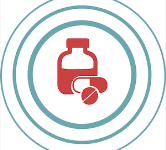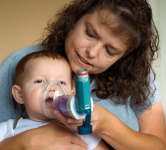FREE! Stop That Clot: Haemostasis and anticoagulants
2 hours
2 hours
Aspirin
Platelets contain cyclooxygenase enzyme (COX), required for synthesis of thromboxane by platelets (Figure 2). Aspirin is an irreversible inhibitor of COX, preventing platelet aggregation. COX is also needed for synthesis of prostaglandin PGI2 by endothelial cells. PGI2 inhibits platelet aggregation. With continuous aspirin therapy, platelet thromboxane decreases more than PGI2. Platelets cannot synthesise more COX molecules once inactivated by aspirin. Endothelial cells, because they have a nucleus, are able to replace COX continuously so can produce PGI2 even in the presence of COX inhibitors (Rang et al., 2012). Little thromboxane is synthesised after even a low dose of aspirin until affected platelets are replaced over the next 7 to 10 days.The main adverse effect of aspirin is gastrointestinal bleeding. While this risk is reduced with low dose aspirin, it is still deemed to outweigh the benefits for those with low risk of cardiovascular disease. Aspirin is not recommended as a primary prevention measure in the wider population (Barnett et al., 2010).
Other anti platelet agents
Clopidogrel and prasugrel act to inhibit ADP-induced platelet clumping (Figure 2) by irreversibly blocking the platelet ADP receptor (the P2Y12 receptor). The effect lasts for the lifespan of the exposed platelets (5 to 9 days). Ticagrelor is a reversible inhibitor of the ADP receptor.This anti platelet pathway is separate to the thromboxane pathway affected by aspirin, so these drugs may be given with aspirin for greater effect (Rang et al., 2012). P2Y12 receptor inhibitors are given in acute coronary syndromes (e.g. myocardial infarctions) and reduce the risk of recurrent ischaemia and mortality following MI (Indraratna & Cao, 2014). They are prescribed following coronary stent insertion to reduce the risk of clots forming within a stent.
Duration of therapy is 12 months, after this time the risk of bleeding generally outweighs the benefits of the drugs. Abrupt withdrawal of these medications may result in a rebound effect on platelets, causing thrombosis, but the evidence for this is uncertain (Indraratna & Cao, 2014). It is important that anti platelet therapy not be interrupted during these 12 months due to the risk of further infarction or death, and elective surgery should be delayed if possible. The patient's cardiologist should always be consulted if any interruption in therapy is suggested. In acute surgery, the use of platelet transfusions may be required as there is no reversal agent for the drugs. A patient on antiplatelet therapy should always inform other health professionals (dentists, podiatrists, etc) prior to any invasive treatment.
Abciximab inhibits platelet receptors for fibrinogen and other clotting factors, blocking the final step in platelet aggregation and fibrin formation. This drug is a fragment of a monoclonal antibody and is used during angioplasty procedures in conjunction with other agents.
Antiplatelet drugs are not recommended for prophylaxis of VTE (Australian and New Zealand Working Party on the Management and Prevention of Venous Thromboembolism, 2005) or in AF except for aspirin in low risk groups (January et al., 2014).
Antiplatelet drugs are not recommended for prophylaxis of VTE (Australian and New Zealand Working Party on the Management and Prevention of Venous Thromboembolism, 2005) or in AF except for aspirin in low risk groups (January et al., 2014).





